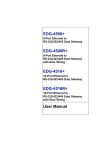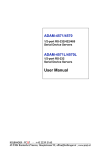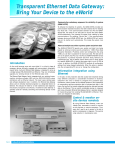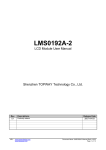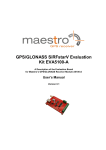Download Advantech ADAM-4571 User manual
Transcript
ADAM-4570/4570L/4570S/ ADAM-4571/4571L/4571S/ EDG-4504 1/2/4 Port RS-232/422/485 to Ethernet Data Gateway User Manual Copyright The documentation and the software included with this product are copyrighted 2007 by Advantech Co., Ltd. All rights are reserved. Advantech Co., Ltd. reserves the right to make improvements in the products described in this manual at any time without notice. No part of this manual may be reproduced, copied, translated or transmitted in any form or by any means without the prior written permission of Advantech Co., Ltd. Information provided in this manual is intended to be accurate and reliable. However, Advantech Co., Ltd. assumes no responsibility for its use, nor for any infringements of the rights of third parties, which may result from its use. Acknowledgements Intel and Pentium are trademarks of Intel Corporation. Microsoft Windows and MS-DOS are registered trademarks of Microsoft Corp. All other product names or trademarks are properties of their respective owners. Part No. 2003457014 6th Edition Printed in Taiwan January 2007 ADAM-4570/4571 & EDG-4504 User Manual ii Product Warranty (2 years) Advantech warrants to you, the original purchaser, that each of its products will be free from defects in materials and workmanship for two years from the date of purchase. This warranty does not apply to any products which have been repaired or altered by persons other than repair personnel authorized by Advantech, or which have been subject to misuse, abuse, accident or improper installation. Advantech assumes no liability under the terms of this warranty as a consequence of such events. Because of Advantech’s high quality-control standards and rigorous testing, most of our customers never need to use our repair service. If an Advantech product is defective, it will be repaired or replaced at no charge during the warranty period. For out-of-warranty repairs, you will be billed according to the cost of replacement materials, service time and freight. Please consult your dealer for more details. If you think you have a defective product, follow these steps: 1. Collect all the information about the problem encountered. (For example, CPU speed, Advantech products used, other hardware and software used, etc.) Note anything abnormal and list any onscreen messages you get when the problem occurs. 2. Call your dealer and describe the problem. Please have your manual, product, and any helpful information readily available. 3. If your product is diagnosed as defective, obtain an RMA (return merchandize authorization) number from your dealer. This allows us to process your return more quickly. 4. Carefully pack the defective product, a fully-completed Repair and Replacement Order Card and a photocopy proof of purchase date (such as your sales receipt) in a shippable container. A product returned without proof of the purchase date is not eligible for warranty service. 5. Write the RMA number visibly on the outside of the package and ship it prepaid to your dealer. iii Declaration of Conformity CE This product has passed the CE test for environmental specifications when shielded cables are used for external wiring. We recommend the use of shielded cables. This kind of cable is available from Advantech. Please contact your local supplier for ordering information. FCC Class A Note: This equipment has been tested and found to comply with the limits for a Class A digital device, pursuant to part 15 of the FCC Rules. These limits are designed to provide reasonable protection against harmful interference when the equipment is operated in a commercial environment. This equipment generates, uses, and can radiate radio frequency energy and, if not installed and used in accordance with the instruction manual, may cause harmful interference to radio communications. Operation of this equipment in a residential area is likely to cause harmful interference in which case the user will be required to correct the interference at his own expense. FCC Class B Note: This equipment has been tested and found to comply with the limits for a Class B digital device, pursuant to part 15 of the FCC Rules. These limits are designed to provide reasonable protection against harmful interference in a residential installation. This equipment generates, uses and can radiate radio frequency energy and, if not installed and used in accordance with the instructions, may cause harmful interference to radio communications. However, there is no guarantee that interference will not occur in a particular installation. If this equipment does cause harmful interference to radio or television reception, which can be determined by turning the equipment off and on, the user is encouraged to try to correct the interference by one or more of the following measures: • Reorient or relocate the receiving antenna. • Increase the separation between the equipment and receiver. • Connect the equipment into an outlet on a circuit different from that to which the receiver is connected. • Consult the dealer or an experienced radio/TV technician for help. ADAM-4570/4571 & EDG-4504 User Manual iv Technical Support and Assistance Step 1. Visit the Advantech web site at www.advantech.com/support where you can find the latest information about the product. Step 2. Contact your distributor, sales representative, or Advantech's customer service center for technical support if you need additional assistance. Please have the following information ready before you call: - Product name and serial number - Description of your peripheral attachments - Description of your software (operating system, version, application software, etc.) - A complete description of the problem - The exact wording of any error messages Safety Instructions 1. Read these safety instructions carefully. 2. Keep this User's Manual for later reference. 3. Disconnect this equipment from any AC outlet before cleaning. Use a damp cloth. Do not use liquid or spray detergents for cleaning. 4. For plug-in equipment, the power outlet socket must be located near the equipment and must be easily accessible. 5. Keep this equipment away from humidity. 6. Put this equipment on a reliable surface during installation. Dropping it or letting it fall may cause damage. 7. The openings on the enclosure are for air convection. Protect the equipment from overheating. DO NOT COVER THE OPENINGS. 8. Make sure the voltage of the power source is correct before connecting the equipment to the power outlet. 9. Position the power cord so that people cannot step on it. Do not place anything over the power cord. 10. All cautions and warnings on the equipment should be noted. 11. If the equipment is not used for a long time, disconnect it from the power source to avoid damage by transient overvoltage. 12. Never pour any liquid into an opening. This may cause fire or electrical shock. v 13. Never open the equipment. For safety reasons, the equipment should be opened only by qualified service personnel. 14. If one of the following situations arises, get the equipment checked by service personnel: a. The power cord or plug is damaged. b. Liquid has penetrated into the equipment. c. The equipment has been exposed to moisture. d. The equipment does not work well, or you cannot get it to work according to the user's manual. e. The equipment has been dropped and damaged. f. The equipment has obvious signs of breakage. 15. DO NOT LEAVE THIS EQUIPMENT IN AN ENVIRONMENT WHERE THE STORAGE TEMPERATURE MAY GO BELOW 20° C (-4° F) OR ABOVE 60° C (140° F). THIS COULD DAMAGE THE EQUIPMENT. THE EQUIPMENT SHOULD BE IN A CONTROLLED ENVIRONMENT. 16. CAUTION: DANGER OF EXPLOSION IF BATTERY IS INCORRECTLY REPLACED. REPLACE ONLY WITH THE SAME OR EQUIVALENT TYPE RECOMMENDED BY THE MANUFACTURER, DISCARD USED BATTERIES ACCORDING TO THE MANUFACTURER'S INSTRUCTIONS. The sound pressure level at the operator's position according to IEC 7041:1982 is no more than 70 dB (A). DISCLAIMER: This set of instructions is given according to IEC 704-1. Advantech disclaims all responsibility for the accuracy of any statements contained herein. Safety Precaution - Static Electricity Follow these simple precautions to protect yourself from harm and the products from damage. 1. To avoid electrical shock, always disconnect the power from your PC chassis before you work on it. Don't touch any components on the CPU card or other cards while the PC is on. 2. Disconnect power before making any configuration changes. The sudden rush of power as you connect a jumper or install a card may damage sensitive electronic components. ADAM-4570/4571 & EDG-4504 User Manual vi Contents Chapter 1 Overview .......................................................... 2 1.1 1.2 1.3 1.4 Chapter Introduction ....................................................................... 2 Features ............................................................................. 2 Specifications .................................................................... 2 Package Checklist ............................................................ 4 1.4.1 1.4.2 1.4.3 ADAM-4571/4571L/4571S ........................................... 4 ADAM-4570/4570L/4570S ........................................... 4 EDG-4504 ...................................................................... 4 2 Getting Started ................................................ 6 2.1 Understanding the Advantech EDG Series ....................... 6 2.1.1 2.1.2 2.1.3 2.1.4 2.1.5 2.1.6 2.1.7 2.1.8 2.2 Network Architecture .................................................... 6 Secure Communication .................................................. 6 Data Integrity ................................................................. 7 Access Control and Local Password Configuration ...... 7 ADAM-4571/4571L/4571S ........................................... 8 Table 2.1:ADAM-4571/4571L/4571S LED Definition . 8 Figure 2.1:ADAM-4571/4571L/4571S—Top Panel ..... 9 Figure 2.2:ADAM-4571/4571L/4571S—Front Panel ... 9 Figure 2.3:ADAM-4571/4571L/4571S—Back Panel ... 9 ADAM-4570/4570L/4570S ......................................... 10 Table 2.2:ADAM-4570/4570L/4570S LED Definition ... 10 Figure 2.4:ADAM-4570/4570L/4570S—Top Panel ... 10 Figure 2.5:Front Panel ................................................. 11 Figure 2.6:ADAM-4570/4570L/4570S—Back Panel . 11 EDG-4504 .................................................................... 12 Table 2.3:EDG-4504 LED Definition ......................... 12 Figure 2.7: EDG-4504—Top Panel ............................. 12 Figure 2.8:EDG-4504—Front Panel ............................ 13 Figure 2.9:EDG-4504—Front Panel ............................ 13 Stickers ......................................................................... 13 Connecting the Hardware................................................ 14 2.2.1 2.2.2 2.2.3 2.2.4 Choosing a Location .................................................... 14 Figure 2.10:Panel Mounting ........................................ 15 Figure 2.11:Din Rail Mounting ................................... 16 Figure 2.12:Piggyback Stack ....................................... 17 EDG-4504 .................................................................... 18 Figure 2.13:Din-rail Mounting .................................... 18 Figure 2.14:Panel Mounting ........................................ 18 Network Connection .................................................... 19 Power Connection ........................................................ 20 Figure 2.15:Connecting EDG Series series to the hub 20 Figure 2.16:Power Connection .................................... 20 i Table of Contents 2.2.5 2.2.6 2.3 Chapter Installation ...................................................................... 23 2.3.1 2.3.2 Configuration Utility .................................................... 23 COM Port Mapping Utility .......................................... 26 3 Configuration................................................. 32 3.1 3.2 3.3 3.4 3.5 3.6 Chapter Figure 2.17:Power Connection for EDG-4504 ............ 20 Serial Connection ......................................................... 21 Figure 2.18:Serial Connection ..................................... 21 EDG-4504 .................................................................... 22 Figure 2.19:Serial Connection for EDG-4504 ............. 22 Auto Search ..................................................................... 32 Locating EDG series ....................................................... 34 Device System Configuration ......................................... 35 Network Configuration ................................................... 37 Port Configuration........................................................... 38 Security Configuration .................................................... 44 4 Port Mapping Utility..................................... 46 4.1 4.2 4.3 Overview ......................................................................... 46 Virtual COM Port Settings.............................................. 46 Inquiring Virtual COM Port Setting................................ 49 4.3.1 4.3.2 4.3.3 Updating EDG Firmware ............................................. 50 Self Test Function ........................................................ 51 Save the Configuration ................................................ 54 Appendix A Pin Assignments ............................................ 56 A.1 A.2 RS-232 Pin Assignments................................................. 56 RJ-48 Cable PIN Assignment ......................................... 56 A.2.1 A.2.2 1. RS-422 ..................................................................... 56 2. RS-485 ..................................................................... 56 ADAM-4570/4571 & EDG-4504 User Manual ii CHAPTER 1 2 Overview Chapter 1 Overview 1.1 Introduction The Advantech Ethernet Data Gateway series (EDG series) is a fast and cost effective data gateway between RS-232/422/485 and Ethernet interfaces. The ADAM-4570/ADAM-4571/EDG-4504 provides multiple RS232/422/485 serial ports easily individually configured for your needs and ADAM-4570L/4571L provides RS-232 serial ports. 1.2 Features • Up to 255 serial ports for one Windows NT/2000/XP host • Supports 10/100 Base-T Ethernet standard • Supports high transmission speeds up to 230 Kbps • Supports LED indicators: Easy to diagnostic • Auto-searching Windows configuration utility: Easy setting and security protection • Port-mapping utility: Easy to manage 255 ports and self-diag- nostic • Easy to locate specific EDG series • Supports real-time Operating System • Surge protection for RS-485 line and power supply • Mounts on DIN rail, panel or piggyback easily 1.3 Specifications • Protocol: TCP/IP • Network Port: IEEE 802.3, IEEE 802.3u Interface: • Network: 10/100 BASE-T standard ADAM-4570/4571/EDG-4504:RS-232,RS-422, and RS-485 ADAM-4570L/4571L: RS-232 ADAM-4570S/4571S: RS-422 and RS-485 ADAM-4570/4571 & EDG-4504 User Manual 2 • Port: 1/2 Independent RS-232/422/485 Ports ADAM-4571L: 1 x RS-232 ADAM-4571: 1 x RS-232/422/485 ADAM-4571S: 1 x RS-422/485 ADAM-4570L: 2 x RS-232 ADAM-4570: 2 x RS-232/422/485 ADAM-4570S : 2 x RS-422/485 EDG-4504: 4 x RS-232/422/485 Connectors: • Network: • Serial: RJ-45 DB9 for EDG-4504 RJ-48 (RJ-48 to DB-9 cable provided) for ADAM-4571/4571L/4571S/4570/4570L/4570S • Baud Rate: 300 bps to 230 Kbps • Parity bit: odd, even, none, space, mark • Data bit: 5, 6, 7, 8 • Stop bit: 1, 1.5, 2 • Signals: Full Modem control signals (Doesn’t support RAS service) Diagnostic LEDs: Network: TX/RX, Link, Speed (10/100 Mbps ), Power Serial: TX/RX, Status • Utility Software: Auto-detecting configuration utility Easy-to-manage port mapping utility • Drivers Supported:Windows NT/2000/XP driver • Power Requirements: Unregulated 10 to 30 Vdc with surge protection • Power Consumption: ADAM-4571/4571L: 3.5 W ADAM-4570/4570L: 4W EDG-4504: 3 4.5W Chapter 1 • Placement: DIN-rail, panel mounting, piggyback stack (ADAM-4570/4570L/4570S/4571/4571L/4571S) DIN-rail, panel mounting (EDG-4504) • Operating Temperature: 0 ~ 60° C • Storage Temperature: -20 ~ 80° C • Operating Humidity: 20 ~ 95% (non-condensing) • Storage Humidity: 0 ~ 95% (non-condensing) 1.4 Package Checklist 1.4.1 ADAM-4571/4571L/4571S • CD-ROM for utility and manual • 1 RJ-48 to DB9 serial cable • One RS-232 loopback DB9 tester • Five stickers • DIN-rail mounting Adapter • Panel mounting bracket • Stand 1.4.2 ADAM-4570/4570L/4570S • CD-ROM for utility and manual • 2 RJ-48 to DB9 serial cable • One RS-232 loopback DB9 tester • Five stickers • DIN-rail mounting Adapter • Panel mounting bracket • Stand 1.4.3 EDG-4504 • CD-ROM for utility and manual • One RS-232 loopback DB9 tester ADAM-4570/4571 & EDG-4504 User Manual 4 CHAPTER 2 2 Getting Started Chapter 2 Getting Started In this chapter, you will be given an overview of the EDG series hardware installation procedures. 2.1 Understanding the Advantech EDG Series The EDG series is an advanced data gateway unit. It extends traditional COM ports of a PC with access over a TCP/IP network. Through networking, you can control and monitor remote serial devices either over a LAN or over the WAN.Since the EDG series is connected through a TCP/ IP network, you will need to know some basic facts about networking in order to get the server hooked up correctly. 2.1.1 Network Architecture Traditional serial port communication uses a COM port board that slides into one of the slots at the back of your PC. In this case, only the computer containing the board can access the serial port. With the EDG series, you are now able to access the COM port from a distance through local area network. The EDG series can be integrated within the network architecture of any protocol. Note, all serial devices which are connected to the port must have the same protocol running and the same trans- mission speed. Connect devices running different protocols to different ports of the EDG series. 2.1.2 Secure Communication Advanced multiple security features protect the system and make data more private and secure. The ADAM-4570S/4571S guards your network and data by multiple security protections: T-DES (Triple Data Encryption Standard, which is specified in FIPS PUB 46-2 and American National Standard X9.25) strong encryption, PKCS#5 (Password-based Cryptographic Standard #5), and IP address authorization. We apply T-DES using three blocks (8 bytes for each block) for plain text 3-time calculation and PKCS#7 for data padding when block of the plain text isn’t enough for 8 bytes. We apply PKCS#5 algorithm to turn userdefined password into a unique key by means of a hash algorithm. Users only need to specify a pass- word when configuring ADAM-4570S/ 4571S in utility. This prevents important data from being accessed by unauthorized users. ADAM-4570/4571 & EDG-4504 User Manual 6 2.1.3 Data Integrity All records are protected using the symmetry encryption and checksum algorithms. Symmetry encryption protects the data privacy. With checksum, which is protected by encryption, we could guarantee the integrity of data. Transmissions also include a sequence number, which is protected by encryption, so that missing, altered or extra messages are detectable. 2.1.4 Access Control and Local Password Configuration IP access control can block users from unauthorized hosts; it only allows 32 users to access at one time. In addition, the ADAM-4570S/4571S protects all configuration settings from being changed inadvertently. When this option is enabled, only the corresponding PC can configure the module. The multiple security mechanisms work to prevent unauthorized access to your RS-422/485 networks. 7 Chapter 2 2.1.5 ADAM-4571/4571L/4571S There are four LEDs located on the top panel of ADAM-4571/4571L/ 4571S, each with its own specific function. Table 2.1: ADAM-4571/4571L/4571S LED Definition LED Color Status Description ON Heartbeat (1 time/sec) OFF Not working ON Power ON OFF ON Power OFF 100 Mbps speed OFF 10 Mbps speed ON Valid network link OFF Invalid network link Ethernet data being transmitted Red Status/Power Green Red Speed/Link Green ON Red Tx/Rx OFF No data being transmitted ON Data being received OFF ON No Data being received Data being transmitted OFF No data being transmitted ON Data being received OFF No data being received (Ethernet) Green Red Tx/Rx (port1) Green ADAM-4570/4571 & EDG-4504 User Manual 8 Figure 2.1: ADAM-4571/4571L/4571S—Top Panel Figure 2.2: ADAM-4571/4571L/4571S—Front Panel Figure 2.3: ADAM-4571/4571L/4571S—Back Panel 9 Chapter 2 2.1.6 ADAM-4570/4570L/4570S There are five network status LEDs located on the top panel of ADAM4570/4570L/4570S, each with its own specific function. Table 2.2: ADAM-4570/4570L/4570S LED Definition LED Color Red Status/Power Green Red Speed/Link Green Red Tx/Rx (Ethernet) Green Red Tx/Rx (port1) Green Red Tx/Rx (port2) Green Status Description ON OFF ON OFF ON OFF ON OFF ON OFF ON OFF ON OFF ON OFF ON OFF ON OFF Heartbeat (1 time/sec) Not working Power ON Power OFF 100 Mbps speed 10 Mbps speed Valid network link Invalid network link Ethernet data being transmitted No data being transmitted Data being receive No Data being received Serial port data being transmitted No data being received Data being received No data being received Data being transmitted No data being transmitted Data being received No data being received Figure 2.4: ADAM-4570/4570L/4570S—Top Panel ADAM-4570/4571 & EDG-4504 User Manual 10 Figure 2.5: Front Panel Figure 2.6: ADAM-4570/4570L/4570S—Back Panel 11 Chapter 2 2.1.7 EDG-4504 There are 13 LEDs located on the top panel of EDG-4504, each with its own specific function. Table 2.3: EDG-4504 LED Definition LED Status Description ON Heart beat (1 time/sec) OFF ON Not working 10 Mbps speed OFF ON Invalid 10 Mbps Network link 100 Mbps speed OFF ON Invalid 100 Mbps Network link Ethernet data being received OFF ON No data being transmitted Ethernet data being received OFF ON No data being received Serial port data being transmitted OFF No data being received ON Serial port data being transmitted OFF No data being received Status 10M 100M TX (Ethernet) RX (Ethernet) TX (port N) N=1~4 RX (port N) N=1~4 Figure 2.7: EDG-4504—Top Panel ADAM-4570/4571 & EDG-4504 User Manual 12 Figure 2.8: EDG-4504—Front Panel Figure 2.9: EDG-4504—Front Panel 2.1.8 Stickers If you forgot the IP addresses of specific EDG Series or where the host PC is mapped to the ADAM-4570 port, we have provided five stickers for you to note the IP addresses and place in a secure location. For example, 172.20.20.5: The IP address of specific ADAM-4570 160.59.20.89: The IP address of the specific host PC mapped to this port. 13 Chapter 2 2.2 Connecting the Hardware Next, we will explain how to find a proper location for your EDG COMPort series, and then explain how to connect to the network, hook up the power cable, and connect to the EDG Series’s serial port. Note: Before you install EDG Series, you can install other com- munication cards first. 2.2.1 Choosing a Location 2.2.1.1 ADAM-4570/4570L/4570S/4571/4571L/4571S Due to its versatility and innovative design, the ADAM-4570/ 4570L/4570S/4571/4571L/4571S can be: • Fixed to a panel mount • Fxed to a DIN-rail. • Piggyback Stack ADAM-4570/4571 & EDG-4504 User Manual 14 Panel Mounting The ADAM-4570/4570L/4570S/4571/4571L/4571S can be attached to a wall using the included metal brackets. Each bracket comes with four screws; first attach the brackets to the bottom of the ADAM-4570/4570L/ 4570S/4571/4571L/4571S. Next, screw each bracket to a wall. Figure 2.10: Panel Mounting 15 Chapter 2 DIN-rail Mounting You can mount the ADAM-4570/4570L/4570S/4571/4571L/ 4571S on a standard DIN Rail. First, using two screws, attach the metal plate to the DIN Rail bracket. Because the screw heads are beveled, the tops of the screws will be flush with the metal plate. Din Rail Mounting Brackets—Orientation of Metal Plates You can now screw the metal plate with the DIN rail bracket assembly to the bottom of the server is a more convenient way. Next, use the remaining screws to put the metal plate on the bottom of the ADAM-4570/4570L/4570S/4571/4571L/4571S. Figure 2.11: Din Rail Mounting ADAM-4570/4571 & EDG-4504 User Manual 16 Piggyback Stack ADAM-4570/4570L/4570S/4571/4571L/4571S can be stacked as seen in the figure below. Figure 2.12: Piggyback Stack 17 Chapter 2 2.2.2 EDG-4504 Figure 2.13: Din-rail Mounting Figure 2.14: Panel Mounting ADAM-4570/4571 & EDG-4504 User Manual 18 2.2.3 Network Connection There are two ways to use the 10/100Base-T Ethernet connector located on the EDG Series: 1. For Local Area Network (LAN) applications using the EDG Series, you will simply plug one end of your Ethernet cable into the 10/100Base-T connector, and the other end into the hub connected to your network. 2. When installing and configuring, you will find it convenient to hook the EDG Series directly to your computer’s Ethernet card. To do this you will need to use a “crossed-cable”, such as the one supplied with your server. Cabling requirements for the Ethernet side Use an RJ-45 to connect the Ethernet port of the EDG Series to the network hub. The cable for connection should be Category 3 (for 10Mbps data rate) or Category 5 (for 100 Mbps data rate) UTP/STP cable, which is compliant with EIA/TIA 586 specifications. Maximum length between the hub and any EDG Series is up to 100 meters (ca.300 ft). 19 Chapter 2 2.2.4 Power Connection You should take the following steps to connect EDG Series power. Figure 2.15: Connecting EDG Series series to the hub 1. Connect the power cable to 2-pin connector 2. Connect power cable to power adapter Figure 2.16: Power Connection Figure 2.17: Power Connection for EDG-4504 If the EDG Series is working properly, the green power LED will light up, indicating that the EDG Series is receiving power. ADAM-4570/4571 & EDG-4504 User Manual 20 2.2.5 Serial Connection ADAM-4571/4571L/4571S/4570/4570L/4570S The model of the ADAM-4570/4570L/4570S/4571/4571L/ 4571S that you purchased has RJ-48 serial ports on the bottom of module. Depending on your serial device and serial interfaces, there are two options: 1. For an RS-232/422/485 (p.s. ADAM-4570S/4571S don't support RS-232) port you may use a RJ-48 to DB-9 cable which we supply to connect your serial device to the ADAM-4571/4571L/4571S/4570/ 4570L/4570S. Simply plug one end of the cable into the jack, and plug the other end into the serial port jack on your serial device. 2. Refer to the following table for details on serial cable RJ-48 to DB-9 pinouts. Figure 2.18: Serial Connection RJ-48 PIN Name DCD RX TX DTR GND DSR RTS RJ-48 1 2 3 4 5 6 7 8 9 21 CTS RI Chapter 2 DB-9 2.2.6 EDG-4504 The model of the EDG-4504 that you purchased has DB-9 se- rial ports on the bottom of module. Depending on your serial device and serial interfaces, there are two options: 1. For an RS-232/422/485 port you may use a DB-9 cable to connect your serial device to the EDG-4504. Simply plug one end of the cable into the jack, and plug the other end into the serial port jack on your serial device. 2. The DB-9 pinouts is the same as ADAM-4570/4570L/4571 Figure 2.19: Serial Connection for EDG-4504 ADAM-4570/4571 & EDG-4504 User Manual 22 2.3 Installation 2.3.1 Configuration Utility In order to use a PC and an Ethernet network to control serial devices connected to the EDG series, you must first have a host running Windows NT/2000/XP. This type of application also requires the host to have an Ethernet card and TCP/IP protocol installed. The following are the required steps for EDG series: 1. Insert the Advantech industrial communication CD-ROM into the drive (e.g. D:\) on the host PC. Change the host computer's default drive from C: to D: 2. Use your Windows Explorer or the Windows Run command to execute the Setup program (the path for the Setup program on the CD-ROM should be on the CD-ROM should be: D:\Device Server(EDG)\Utility&Driver\EDG COMPort Configuration Utility\V1.xx\98_NT_2000_XP v1.60 b139 3. Upon executing the setup program, the Welcome Dialog Box will popup. Press the "Next" button to continue. 23 Chapter 2 4. Carefully read the Software License Agreement, and press "Yes" to continue. 5. The Setup program will specify a default installation path, C:\Program Files\Advantech\EDG COMPort Utility. ADAM-4570/4571 & EDG-4504 User Manual 24 6. In this step, you may select a specific program folder or just use the default setting and press "Next". 7. After setup has copied all program files to your computer, click the <Finish> button to finish the installation. 25 Chapter 2 2.3.2 COM Port Mapping Utility To setup and enable the Virtual COM on the HOST, you must install this utility on this PC. Driver version 1.xxx is suitable for Window NT/2000/ XP. Driver version 2.xxx is WDM driver and suitable for Window 2000/ XP. After installation of WDM driver, the installed COM port will be displayed in Device Manager. This type of application also requires the host to have an Ethernet card and the TCP/IP protocol installed. The following are the required steps for installing EDG series. 1. Insert the Advantech industrial communication CD-ROM into the drive (e.g. D:\) on the host PC. Change the host computer's default drive from C: to D: 2. Use your Windows Explorer or the Windows Run command to execute the Setup program (the path for the Setup program on the CD-ROM should be D:\Device Server(EDG)\Utility&Driver\EDG COMPort Mapping Utility\2000_XP WDM v2.00 b206, if your default CD-ROM drive is D: ). 3. Upon executing the setup program, the Welcome Dialog Box will popup. Press the "Next" button to continue. ADAM-4570/4571 & EDG-4504 User Manual 26 4. Carefully read the Software License Agreement, and press "Yes" to continue. 27 Chapter 2 5. The Setup program will specify a default installation path, C:\Program Files\Advantech\COMPort Mapping Utility. 6. In this step, you may select a specific program folder or just use the default setting and press "Next". ADAM-4570/4571 & EDG-4504 User Manual 28 7. After setup has copied all program files to your computer, click the <Finish> button to finish the installation. 29 Chapter 2 ADAM-4570/4571 & EDG-4504 User Manual 30 CHAPTER 3 2 Configuration Chapter 3 Configuration 3.1 Auto Search EDG-4508(R)+/4516(R)+ provides an easy-to-use configuration utility to configure your Ethernet Data Gateway Device through an Ethernet connection. For secure administration, it can also restrict the access rights for configuration to only one host PC to enhance network security. With this secure function enabled, other PCs will not have permission for configuration. The utility provides an auto-search function to show your device(s) by simply executing the configuration utility program from the Start Menu as follows. Start Menu --> All Program --> Advantech --> EDG COMPort This EDG configuration utility will automatically search all the EDG devices on the network and show them on the left side of the utility. From here you can easily configure various parameters for TCP/IP configuration. (In this example, the system finds the Ethernet Data Gateway device for ADAM-4570 & EDG-4516+ in a local network) ADAM-4570/4571 & EDG-4504 User Manual 32 You can click on the device name to show the features of the specific device. Click on the "+" before the model name (e.g. EDG-4516(R)+), and the utility will expand the tree structure to show the individual device name. For Example, EDG Configuration Utility shows "ADAM-00D0C968E17F" after expanding the tree structure. Note When you run the EDG configuration utility for the first time, the default device name is "MAC ID". In this case, the device name "ADAM-00D0C968E17F" means the device "MAC ID" is "00 D0 C9 68 E1 7F". You can change the default device name in System Tag of Device Properties. Note Please reserve TCP port 5202 in your network , Configuration will use this port to communicate with Advantech’s EDG series. Change Device Name Here 33 Chapter 3 3.2 Locating EDG series The configuration utility provides a "Locate" function to assist you in finding a specific device. You can select the EDG Series as a group or just select one specific module, e.g. ADAM-4570 or ADAM-4571. There are two different options for the Locate function (1) Designated: locates a specific device for you. 1. Select "Designated" and click "Locate" 2. The "Status" LED will remain steady for 8 minutes. 3. If you choose another device and click on "Locate", the "Status" LED of the previous choice will return to the heart beat monitoring mode. (2) All Devices: To locate all devices for the system. 1. Select "All Devices" and click "Locate" 2. All "Status" LED devices will remain steady for 8 minutes.3. 8 minutes later or when someone enables the "Designated" Locatefunction, the "Status" LED will return to its default heart beat monitoring. Locate Function Button ADAM-4570/4571 & EDG-4504 User Manual 34 3.3 Device System Configuration Four functional categories Device Name Firmware Version Device List Device Description The configuration utility only searches for EDG Series devices on the local network, and cannot search beyond a router or gateway. Make sure that the EDG Series device you want to monitor resides in the same local network segment as the host PC. Ethernet Data Gateway In this column, you will find a list of EDG products if you use the configuration utility to auto-search. Device Name The configuration utility provides a default name to distinguish the different EDG devices from each other. You can update the default device name based on your application. Please note that names are restricted to 128 characters, and it is usually best to choose a name you can remember. Device Description This field records the function, application and other information for each EDG device in more detail for easy management and maintenance. You can describe in your own words. Firmware Version In this field, the configuration utility presents the firmware version of the EDG Series (e.g. V 1.10). You might need to refer to the firmware version to determine what functions are available on the EDG device. For problems related to firmware version, please provide the firmware version number to our Customer Service. 35 Chapter 3 Password Setting While you select ADAM-4571S or ADAM-4570S, Password section will display. When you press down the "setting" button in Password section,a window pops up asking whether to use TDES encryption by entering user-defined password. The window will ask you to reenter the password for confirmation. If it doesn't match the original one, then you can't proceed other configurations. If you choose to use TDES encryption but leave the password column blank, the utility will apply default password. ADAM-4570/4571 & EDG-4504 User Manual 36 3.4 Network Configuration TCP/IP Option Ethernet Option Ethernet Option MAC Address This does not need configuration. Link Speed This function will show the current linking speed to be either 10Mbps or 100Mbps. However, the utility will auto-detect the current transmission speed on the network segment and set the transmission speed for the device accordingly. Duplex Mode The utility will detect the current transmission mode (half-duplex or full-duplex) on the network segment, and set the transmission mode for the device accordingly. TCP/IP Option IP address, Subnet Mask, Default Gateway The IP address identifies your EDG device on the global network. Each EDG device has the same default IP address 10.0.0.1. Obtain a specific IP address from your network administrator and then configure each EDG device with an individual IP address, related Subnet Mask and Gateway Setting. Note EDG devices do not support auto IP address configured by DHCP server. 37 Chapter 3 3.5 Port Configuration Port Setting Option Port Configuration Option Port Setting You can modify the description for individual port settings in the Port Setting Option. Name Specify which port will be connected to the the serial device 1 Port for ADAM-4571/4571L/4571S 2 Ports for ADAM-4570/4570L/4570S 4 ports for EDG-4504 Description Show individual description for each port. You can give more detailed description of the function of the port for easy management and maintenance. Descriptions longer than 128 characters cannot be used. ADAM-4570/4571 & EDG-4504 User Manual 38 Port Configuration You can modify port configuration in this Configuration Option such as Type, Parity, Flow Control, Data Bits, Stop Bits, Baud Rate and Host Idle Timeout. Type Serial Port Type EDG Series offers three kinds of serial interfaces, RS-232, RS-485 and RS-422. You can use any of the three serial interfaces according to your requirements. 39 Chapter 3 Parity Parity Check Type You can follow the parity check type of your connected module. The following types are provided. • None • Odd • Even • Mark • Space Flow Control Flow Control Type You can choose the flow control type of your connected module. The following types are available. • None • Xon/Xoff • RTS/CTS • DTR/DSR ADAM-4570/4571 & EDG-4504 User Manual 40 Data Bits Data Bits Type You can choose the number of Data Bits of your connected module to be 5, 6, 7 or 8. Stop Bits Stop Bits Type You can choose 1, 1.5 or 2 Stop Bits for your connected module 41 Chapter 3 Baud Rate Flow Control Type You can choose the Baud Rate of your connected module. The following rates are available: • 7,200 • 9,600 • 14,400 • 19,200 • 38,400 • 57,600 • 115,200 • 230,400 * Set All Port The ‘Set All Port’ function helps you set all serial ports at one time. All you need is to set one port and click the "Set All Port" button. The other ports will then follow the first port that you have set up. This is faster than setting up 2 ports (ADAM-4570/4570L/4570s) or 4 ports (EDG-4504) with the same settings. ADAM-4570/4571 & EDG-4504 User Manual 42 Host Idle Timeout The ‘Host Idle Timeout’ setting monitors the connection between the host and the device. If the ‘Host Idle Timeout’ setting time is reached, the device will release the resources allocated to the port mapping. This prevents a stalled host from affecting the connected device. . Note Host Idle Timeout and Auto Reconnection Function Detail Host Provide Auto Reconnection Function Ethernet di g i t a l EDG Device Support Host Idle Timeout Detect Function Auto Reconnection An auto reconnection function is provided by the host. Under certain circumstances (such as: Ethernet connection failure, device power down or the auto reconnection function will try to reconnect the assigned device when application issue COM port command( such as: read COM port status, write data to COM port... etc) 43 Chapter 3 3.6 Security Configuration For security reasons, you are highly recommended to use EDG’s security features. The EDG configuration utility provides security functions for the network structure. Only configure the allowed IP The system will auto detect the IP address for the currently connected computer. If you enable this function, only your current host computer can access this EDG Device. *If you use Dynamic IP Assignment by the DHCP Server, we suggest that this function is not enabled. Allow any IP to access If you enable this function, any IP address can access your device and there is no access restriction. Specified IP can access EDG device You can assign a specific IP address that have have authority to access the EDG device. Assign the IP address and click on "Add" to add a specified IP or choose the IP address list below and click on "Delete" to remove the IP from the access list. ADAM-4570/4571 & EDG-4504 User Manual 44 4 CHAPTER 2 Port Mapping Utility Chapter 4 Port Mapping Utility 4.1 Overview The purpose of the port mapping utility is to help you manage all ports on one Windows NT/2000/XP platform. There are two different COM port mapping utility, version v1.xxx and version v2.xxx. Utility version v1.xxx is suitable for NT/2000/XP and all EDG series devices. Utility v2.xxx is a WDM driver and suitable for 2000/XP platform. Utility doesn't support ADAM-4570S and ADAM-4571S. The installed COM will be displayed in Device Manager while using COMport mapping utility v2.xxx. The operation of utility v1.xxx and v2.xxx are totally same. The utility displays three types of ports: used ports, unused ports and EDG ports. Please follow the Virtual COM port setting steps. 4.2 Virtual COM Port Settings 1. Click "+" at "Unused Ports" to expand the unused port lists, and select the port that you want to configure. Click "+" to expand the list Unused Ports List ADAM-4570/4571 & EDG-4504 User Manual 46 2. Click the ADD button to assign a COM port to an EDG device. Module of Installed Device You can choose between all connected EDG devices. In this example, "EDG-4516+" was chosen. IP Address of Installed Device Enter the IP address you assigned in chapter 3.4. Port of Installed Device Choose the port where you want to setup: 1 port for ADAM-4571/4571L/ 4571S and 2 ports for ADAM-4570/4570L/4570S and 4 ports for EDG4504. Properties (Auto Reconnect Function) Sometimes, the system may crash because the EDG device is interrupted or powered-off by accident. In such a situation, the host PC need to reconnect to the EDG device automatically. EDG devices provide an "Auto-reconnect" function for this purpose. If the EDG device loses the connection to its host, the driver will automatically try to re-establish the connection. When the connection is working again, the host PC's commands will be automatically received by the EDG Series again. Reconfiguration is not necessary, so this function enhances the reliability of the system. Memo You can add a description to the port setting if necessary. 47 Chapter 4 Add Click here to add a single port setting to your specification. Add All You can assign all ports to follow current settings by clicking the "Add All" button. This is more convenient than adding ports individually. For this example, we have selected COM21 and made all necessary settings for Port 1 of EDG-4516+. After clicking on the "Add All" button, the COM Port Mapping Utility will assign the COM21 ~ COM36 mapping to Port 1 ~ Port 16. (COM21 is mapping to Port 1 of EDG-4516+) (COM22 is mapping to Port 2 of EDG-4516+) ADAM-4570/4571 & EDG-4504 User Manual 48 Note If you assigned a different COM port to the same EDG series module port, the following dialog box will remind you. 4.3 Inquiring Virtual COM Port Setting You can check the virtual COM port setting by clicking on the EDG device’s ports. In this case, COM11 is assigned to Port 1 of EDG-4516+. 49 Chapter 4 4.3.1 Updating EDG Firmware Updating Firmware Advantech continually upgrades its firmware. You can use the download function located on the Port Mapping utility to carry out the upgrade procedure. Please access Advantech's web site at http://www.advantech.com to download the required computer file and then follow these instructions. 1. Click on the Update FW icon in the toolbar. 2. Locate and then select the filename of the firmware that you have downloaded. 3. After the firmware has been downloaded into the EDG device, click the Reboot button. 4. Restart COMport mapping utility so that it can recognize the updated firmware on the EDG device. Note After clicking the Reboot button, the configuration utility will not reboot the EDG device. ADAM-4570/4571 & EDG-4504 User Manual 50 4.3.2 Self Test Function Test The purpose of this test is to confirm that the communication from the host PC to the EDG device is OK. When the test is selected, an external test will be performed to check that the connection signal between each port is working properly. For this test, you will need to connect each port to a Loopback tester. Refer to the following chart for specifications of this Loopback tester. The Loopback test only applies to RS-232 mode. It is divided in two parts: Signal test and Communication Parameters test. 1. Click on the Test button in the Port Mapping utility. A message will confirm that the loopback connector have already been connected with the EDG COM port. If ready, click the Start button to start the test. Test Fail (Without Loopback Connector) Test ok 51 Chapter 4 Signal Test • RTS->CTS: Checks the RTS and CTS signals between two ports. • DTR->RI: Checks the DTR and RI signals between two ports. • DTR->DSR: Checks the DTR and DSR signals between two ports. • DTR->DCD: Checks the DTR and DCD signals between two ports. Communication Parameters Test • Baud rate: From 50 bps to 230 kbps • Data bits: 5, 6, 7, 8 • Stop bits: 1, 1.5, 2 • Parity: odd, even, none, space, mark 2. Click the OK button to return to the port mapping window. All the ports in the EDG Series are tested ok. ADAM-4570/4571 & EDG-4504 User Manual 52 Delete You can delete Port Mapping Setting by clicking the [Delete] button. Apply If any changes are made, please press the [Apply] button to confirm your modifications. Exit If you want to finish setting or quit the utility, please click on the [Exit] button. If any changes are made in the COM Port Mapping setting, all change will be enabled after quitting the utility. Note If you delete a virtual COM Port and the COM port is occupied by application, the HOST PC might crash and come out BLUE SCREEN. 53 Chapter 4 4.3.3 Save the Configuration If you want to save or recover the configuration, you can select the "Import/Export" items. 1. a. Select "File" b. Select "Import" or "Export". 2. Save or open the configurations ADAM-4570/4571 & EDG-4504 User Manual 54 A APPENDIX 2 Pin Assignments Appendix A Pin Assignments A.1 RS-232 Pin Assignments A.2 RJ-48 Cable PIN Assignment A.2.1 1. RS-422 Pin No. Description 1 Tx- 4 Tx+ 5 GND 7 Rx+ 9 Rx- A.2.2 2. RS-485 Pin No. Description 1 Data- 4 Data+ 5 GND ADAM-4570/4571 & EDG-4504 User Manual56
































































